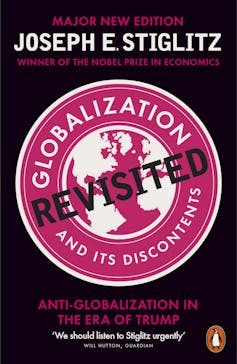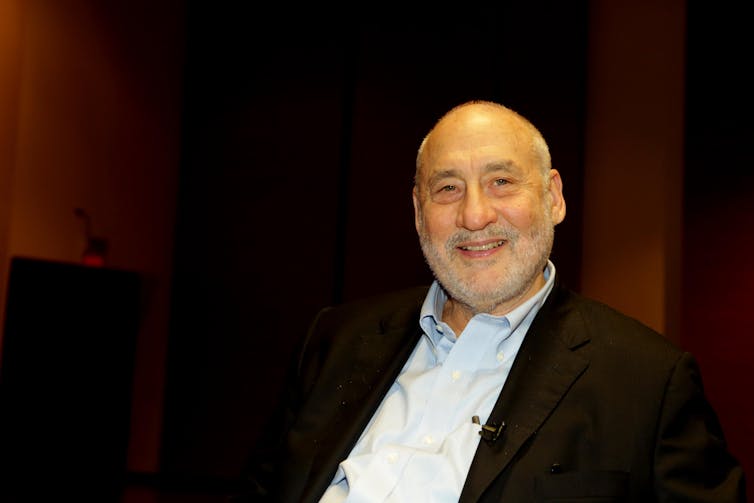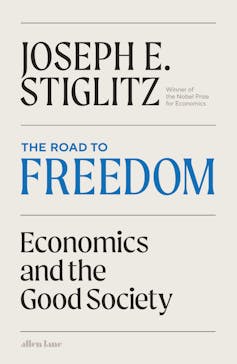A ‘superficial’ and ‘misguided’ version of freedom has captured the American right. Joseph Stiglitz considers the alternatives
Reflecting on the famous slogan of American jurist James Otis – “taxation without representation is tyranny” – Stiglitz observes with concern that many on the contemporary US right seem to have arrived at the view that “taxation with representation is also tyranny”.
This type of thinking has increased over the decades, extending from Ronald Reagan’s claim that “markets are the solution, government is the problem” to Ted Cruz’s call to abolish entire government departments – including the IRS, the Department of Education and the Department of Energy – and Ron Paul’s assertion that “the more government spends the more freedom is lost”.
Something, argues Stiglitz, has gone awry with the conception of freedom here.
 Liberty Bell. E-crow/Shutterstock
Liberty Bell. E-crow/Shutterstock
Review: The Road to Freedom: Economics and the Good Society – Joseph Stiglitz (Allen Lane)
In The Road to Freedom, Stiglitz critiques what he sees as the “superficial” and “misguided” interpretation of freedom that has gained ascendancy in the period of neoliberal globalisation. This view, he says, is held in common by the assortment of conservatives, libertarians and other right-of-centre people that make up the US right.
Focusing on the US, he argues that the way the idea has been defined and pursued has led to the opposite of “meaningful freedom”. It has failed “to give due recognition to how interdependent people are in a modern economy” and led to a vast reduction in the “freedoms of most citizens”.
The most important value
Stiglitz has a long resumé, which includes serving as chair of the Council of Economic Advisers during the Clinton administration. He is a former senior vice president and chief economist of the World Bank and is currently a professor at Columbia University. He was awarded a Nobel Memorial Prize in Economic Sciences in 2001. In 2011, he was named by Time as one of the world’s 100 most influential individuals.
The author of many works and a longstanding critic of the neoliberal turn in economics and public policy, Stiglitz is perhaps best known to a wider public for his bestselling book, Globalization and Its Discontents (2002). There, he critiqued the neoliberal global trade order, which he argued was exploitative, hindered developing economies and was driven by faulty assumptions about how markets work.

Written in an accessible style, his new book takes an economist’s lens to the topic of freedom. He draws on a wide range of work in economics, including his own, in fields such as information economics and behavioural economics. He also draws on a range of material on politics, including work by key thinkers in liberal philosophy such as Isaiah Berlin and John Rawls.
Economics, Stiglitz writes, provides “tools to think about the nature of the trade-offs that should be central to discussions about freedom”, and about how those trade-offs should be addressed. Extending his earlier work, he argues for “an economic and political system that delivers not only on efficiency and sustainability but also on moral values”.
The most important value, he says, is freedom. But his is a broadened concept of freedom, “conceived as having inherent ties to notions of equity, justice and well-being”. A key part of his argument is that the “powerful strands in modern economic thinking” that have come to be termed neoliberal assume that “the freedom that matters most, and from which other freedoms indeed flow, is the freedom of unregulated, unfettered markets”.
This conflation of freedom with unregulated markets comes with “huge risks for society”. The policies that “freed” the financial sector, Stiglitz points out, led directly to the “the largest financial crash in three-quarters of a century”. Deregulating the banks and failing to regulate derivatives led bankers to use their new freedom to “enhance their profits”.
The 2008 global financial crisis made it clear that this freedom for bankers came at the expense of workers, ordinary investors and homeowners. And, Stiglitz adds, “we as a society lost our freedom”, because “we had no choice but to bail out the banks or the entire financial system would have collapsed”.

A deeper understanding of freedom
Stiglitz notes the way neoliberal policies have freed corporations to “exploit consumers, workers and the environment”, and freed trade to “accelerate de-industrialization” in the US. The combination of key economic developments, such as globalisation and monopolisation, and the resulting concentration of economic power, have played a significant role in “increasing inequality, slowing growth and reducing opportunity”.
These massive inequalities are socially corrosive. The incentives of neoliberal capitalism, Stiglitz writes, “have done much to weaken trust”, which has led to a “narrowing of vision and values”. They engender selfish and dishonest behaviour. “Without adequate regulation, too many people, in the pursuit of their own self-interest, will conduct themselves in an untrustworthy way, sliding to the edge of what is legal, overstepping the bounds of what is moral.”
This has led, in turn, to the rise of populism. “The challenges and attacks on democracy have never been greater in my lifetime,” Stiglitz warns. “Trump is what neoliberalism produces.”
Neoliberal capitalism, he emphasises, “does not enhance freedom in our society”. It obstructs the understanding people have about “how their actions might constrain the freedom of others”. In general, it “curtails the freedom of the many while it expands the freedom of the few”. As such, Stiglitz argues for “a deeper understanding of the meaning of freedom”, seeking to “strengthen democratic debate of what economic, political and social system will best contribute to the freedom of the most citizens”.

A key problem is simply an inadequate view of markets. Stiglitz points out that the concept of “unfettered markets” is an oxymoron, because it is the state and its laws that provide the framework within which people transact. “Without rules and regulations enforced by government, there could and would be little trade,” he observes. “Cheating would be rampant, trust low.”
The view that “competitive markets are efficient” is also mistaken, because they are subject to contingencies of imperfect information and incomplete contracts. So too is the belief that “markets on their own would somehow remain competitive” – a proposition that simply ignores “the experiences of monopolization and concentration of economic power”.
Without well-designed regulation to ensure competition, Stiglitz argues, “firms on their own will subvert competition in one way or another and power becomes more and more concentrated”. In addition, he highlights “critical market failures” – for example, in protecting the environment and managing natural resources. Regulation is thus necessary to “prevent exploitation of each other and the environment”.
Freedoms, negative and positive
A key part of what Stiglitz wants us to see is that the rules and regulations that govern economies are not “laws of nature”. The economic forces that both enable and constrain our individual choices and actions in a market economy are significantly shaped by socially determined policy choices.
The simplistic neoliberal view fails to appreciate how political freedom and economic freedom, in fact, work together. Instead, this view reduces our political freedom to its own “narrow” economistic version. This has led to the well-rehearsed TINA (“there is no alternative”) theme in public political discourse. What is impaired is “a critical societal freedom” – the “freedom to choose an economic system that could, in fact, enhance freedom for most citizens”.
Stiglitz discusses Isaiah Berlin’s distinction between “negative” and “positive” freedom. Negative freedom refers to “freedom from” – freedom from hunger or state coercion, for example. Positive freedom means “freedom to do” – that is, having the opportunity and resources to be able to choose and act for oneself.

The positive definition is central to what Stiglitz calls the “most meaningful sense of freedom”. He discusses the concept in terms of “opportunity sets”, arguing that, since the set of options a person has available to them defines their freedom to act, any “reduction in the scope” of possible actions represents a loss of freedom. Someone who is just scraping by “really doesn’t have much freedom”, he observes – “they do what they must to survive”.
The neoliberal definition narrows the concept of freedom so that it focuses on the negative “freedom from” part – specifically, the state’s imposition of regulations and taxes. It downplays or ignores a crucial aspect of the “freedom to” part: the freedom to pursue one’s interests, “to live up to one’s potential”.
As economist Brian Callaci summarises, the Right focuses on “the freedom of the individual to follow their whims”. In doing so, it has
blinded itself to the more urgent question of whether individuals actually have the ability to pursue their chosen ends. […] what shrinks the “opportunity sets” of the majority of individuals is not the state “coercion” involved in legal rules and regulations, but the constraints placed on people by income and wealth, and by the lack of sufficient social support.
The kind of people we want to be
Markets enable but also constrain freedom of choice. The classic liberal view is that, in a pluralistic modern society, markets function as individual “preference satisfaction machines”. You are free to use your own money to buy whatever goods you want in whatever quantities you can afford.
This freedom to transact was historically liberating. But markets also constrain people’s freedom of choice. They allocate goods based on the ability to pay, so production in general is driven by the preferences of the wealthiest. The preferences of people with little money have little effect, and for people with no money they go unmet.
In reality, power in markets is unequal. People can be compelled to agree to coercive contracts, such as nondisclosure or noncompete agreements, all the way to indentured servitude. And “market discipline” also serves to limit our freedom to choose – to “coerce” us into not pursuing actions or making investments that are socially beneficial but not immediately profitable.
Behavioural economics has demonstrated that “individuals differ markedly from the way they are depicted in the standard economic theory”. They are less rational, but also less selfish and more “other regarding”. The preferences that the market satisfies, Stiglitz points out, are “not set at birth”; they are shaped, in part, by the market itself, conditioned by our social experiences. This is something that “every parent, everyone working in marketing, and everyone waging campaigns of or against mis- and disinformation knows very well”.
As human beings we have desires beyond our preferences for this or that consumer product (first-order desires). We also have desires regarding “what kind of people we want to be” (second-order desires). Satisfying such second-order desires requires collective action to create the economic, political and social rules that reward the preferred values, individual behaviours and social practices.
For example, people may prefer to be more trusting and to “follow the golden rule”. But in a system centred on unfettered markets, which opts not to legislate to adequately protect consumers from exploitation in favour of the market principle of “buyer beware”, the result would be an increase in fraud and swindling, and an increasingly mistrustful society, undermining people’s capacity to be the ethical citizens they would like to be.
On the other hand, having robust regulation that prohibits fraud and deception rewards trust and allows individuals to live as the people they would like to be. As Stiglitz points out, this does not violate market freedom, as well-designed “guardrails” are a prerequisite for its flourishing.
Stiglitz advocates an alternative to neoliberalism he calls “progressive capitalism”, or for a European audience “rejuvenated social democracy” along the lines of “a twenty-first century version of […] the Scandinavian welfare state”. While clearly a believer in the merits of “large parts of the economy” being “in the hands of profit-oriented enterprises”, his favoured model operates with a broader conception of freedom than the unduly narrow and reductive neoliberal version.
In the interests of a well-functioning economy and society, he argues for “a better balance between the market and the state”. This includes redistributive policies, antitrust laws and regulations to tame corporate power, as well as support for trade unions and civil society organisations such as not-for-profit enterprises.
Policy programs for providing things like infrastructure, housing, employment and health care should be viewed as “enhancing freedom”. Limiting the freedom of some individual economic agents (“the rich”), via the “mild coercion” of regulation and redistributive taxation, enhances the welfare of the majority by expanding opportunity sets. “As in all things,” Stiglitz states, “there are trade-offs.”![]()
Christopher Pollard, Sessional Academic in Sociology and Philosophy, Deakin University
This article is republished from The Conversation under a Creative Commons license. Read the original article.



